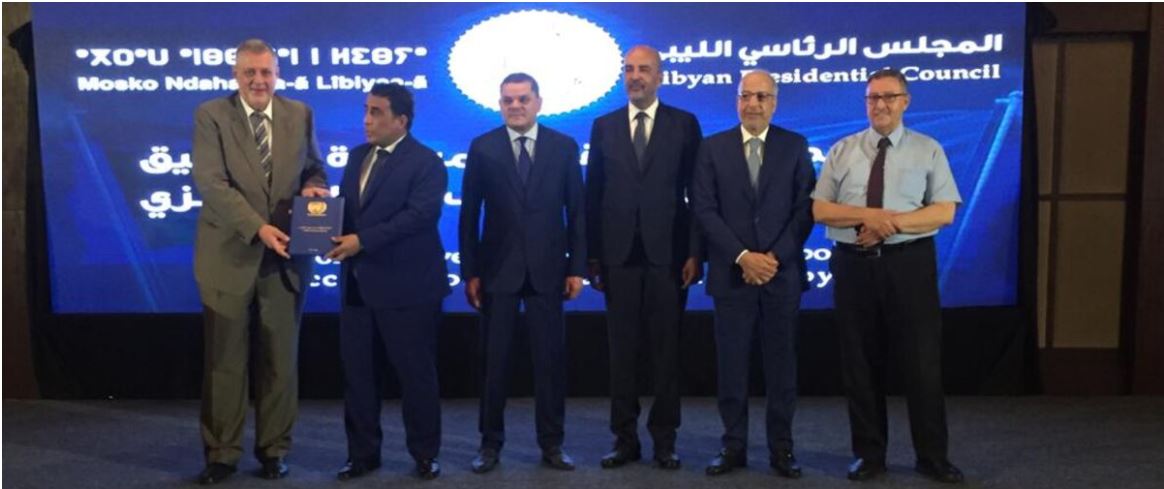Former Deputy and Acting UNSMIL head, Stephanie Williams, said the review/audit report of the two branches of the Central Bank of Libya (CBL) by the United Nations should be revealed to the Libyan public.
The CBL audit, conducted by international auditing major Deloitte, was handed over at an official ceremony on 8 July 2021 by the then UNSMIL head, Jan Kubis, to Prime Minister Abd Alhamid Aldabaiba, Presidency Council head Mohamed Menfi, Tripoli CBL Governor Saddek El-Kaber and Eastern CBL Governor Ali Hibri.
Williams, quoted by various media and direct sources, said the Deloitte report is the right of all Libyans and should be published to the media. Unfortunately, it was not disclosed by the four parties that received the report, she added.
Williams said she has never seen the report and that she did not read anything from it and was not a party when it was completed and during its submission. The report was handed over to her successor, Kubis.
Williams urged the Presidential Council, the Government, and both branches of the Central Bank of Libya to inform the Libyan people of the report.
Oil wealth distribution is the driver of Libya’s conflict
It will be recalled that in previous media statements Williams had confirmed that in her view the way that Libya’s oil revenues are managed in Libya is the main driver of the Libyan conflict,
As Libya is a rentier state with more than 90% of the state’s revenues coming from this single source, Libya’s ruling class after the 2011 used a complex structure of state institutions, including state corporations, as a kind of “milk cow” for personal gain, she had explained.
Williams said that there is resistance to transparency and accountability in Libya and acknowledged that there was a lot of resistance to practicing transparency and accountability by Libya’s stakeholders.
Mistake to hide report
The former Acting UNSMIL head considered the completion of the CBL audit process an ideal opportunity to engage in the practice of transparency, accountability, and implementation. Unfortunately, the decision was made to allow the current government to take the audit report and put it in the drawer. This she considered a mistake.
CBL not working as it should
While praising the Central Bank’s issuing of a monthly disclosure of its activities, Williams stressed that the bank is still not working as it should, as it must be managed by the Board of Governors, and this is the Libyan banking law, adding that there should not be a sovereign institution that violates the law.
Interim government’s spending must be restricted
Williams said the Libyan interim government must be restricted in its capacity to spend, because it is not an elected government, it is temporary, and lacking by its nature that legitimacy that comes only through the ballot box. She was critical of its formation of a huge cabinet, with the expenses that it requires.
Conspiring against the people
Critics and analysts see the suppression of the report as part of a wider conspiracy against the Libyan people by its corrupt ruling elite. The incumbent stakeholder, consisting of the House of Representatives, the unelected High State Council, the interim government, the Tripoli CBL Governor and a militia-business cartel represent a group who benefit from the status quo.
These, sometimes referred to by critics as the ‘‘status quo dinosaurs’’ are resistant to change and specifically any elections that would result in the loss of their current positions. They benefit from the Libyan rentier state at the expense of the public at large. Their resistance to change, reform and elections comes at the expense of Libya’s long-term stability
In this regard, its assumed that the CBL audit report would cause much disquiet amongst the public. It is feared that its contents would be so damning that the public would call, if not agitate for change: elections.
The CBL audit report
It will be recalled that at the time, UNSMIL had said the main finding of the review is that the unification of the CBL is no longer simply recommended but required.
The audit report, UNSMIL had reported, highlighted opportunities to reform and improve the Letter of Credit issuance process. The report had provided a series of recommendations to restore the integrity of the CBL and improve its transparency, including but not limited to the adoption of International Financial Reporting Standards, assessment of the impact of the devaluation of the Libyan Dinar, and establishment of effective governance and internal controls.
The presentation to Libya of the audit closed a three-year process initiated by the former head of the Presidency Council (PC), Faiez Serraj, who had requested support from the UN to conduct the Review.
CBL audit report presented to Libya (libyaherald.com)
CBL welcomes audit report and says it will pursue reunification (libyaherald.com)
CBL working on reunifying its two branches (libyaherald.com)
The two branches of the CBL meet to further unification efforts (libyaherald.com)
Audit Bureau demands CBL be more transparent and cooperative in providing data (libyaherald.com)
UNSMIL reviews preliminary CBL audit, final report expected this month (libyaherald.com)







